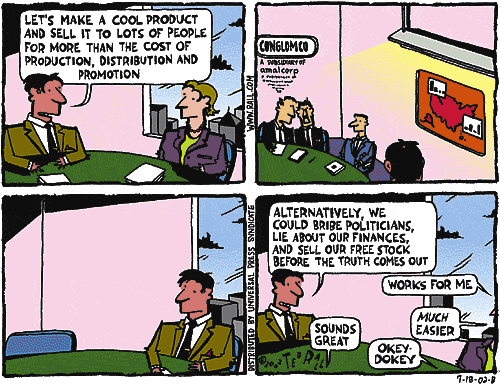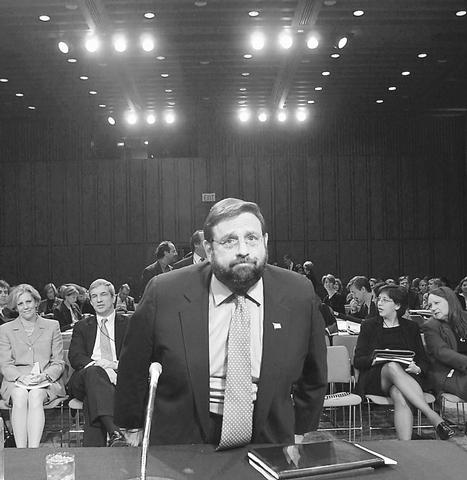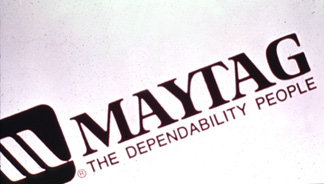Collected Quotes
The genius of capitalism
December 28, 2002
I want to assure you that I have never felt better about the prospects for the company. 1
Enron CEO Ken Lay, after selling $160 million of his own company stock (August 14, 2001)
Enron used its political clout to create what one of its own executives called a “regulatory black hole” in which it could operate freely. 3
Paul Krugman, The New York Times (December 11, 2001)

©2001 Joe Crawford (December 13, 2001) www.ArtLung.com
Companies come and go. It’s part of the genius of capitalism. 2
PaulO’Neill, Treasury secretary, on the collapse of Enron (January 14, 2002)
Not in memory has a single major company grown so big in tandem with a presidential dynasty and a corrupted political system. 15
Kevin Phillips, Republican political analyst, on ties between the Bush administrations and Enron, Halliburton, and Harken Energy (February 10, 2002)

©2002 Salon Media Group, Inc. dir.salon.com/topics/tom_tomorrow
The feeding frenzy is pretty much over. 6
Senator Phil Gramm, Republican – Texas, on the defeat of new controls on corporate and accounting conduct. Gramm’s wife, Wendy, resigned from Enron’s board last week. (June 10, 2002).
The Enron corporation used undisclosed reserves to keep as much as $1.5 billion in trading profits off its books during the California energy crisis, according to six former managers and executives. 12
David Barboza, The New York Times (June 23, 2002)
Enron’s made such a killing of this state, they were embarrassed to disclose it to their shareholders. Unfortunately, Enron will live on as a symbol for everything that has gone wrong with electricity deregulation. 12
California Governor Gray Davis (June 23, 2002)
The Bush administration and House Republicans have refused to enact tight financial standards. We’re going to make the point that Republicans have weakened regulation and allowed this to happen. 13
Senator Robert Matsui, Democrat – California (July 5, 2002).
WorldCom is a political boon to the president because it allows him to moralize about epic-scale crime without mentioning Enron, Halliburton or Harken. But the Enron bomb hasn’t been defused. 14
Frank Rich, The New York Times (July 6, 2002)
In the corporate world, sometimes things aren’t exactly black and white when it comes to accounting procedures. 16
George W. Bush, referring to his failure to report a 1990 Harken Energy stock sale, and/or the SEC order for Harken to restate its earnings (July 9, 2002)

©2002 Ted Rall, Universal Press Syndicate www.ucomics.com/tedrall
I find it fascinating that the president, who normally defines the world as good versus evil, declares that “in the corporate world, sometimes things aren’t exactly black and white.” 18
Diana Scholl (July 9, 2002)
There are still too many holes in our regulatory dikes. 19
Felix Rohatyn, Wall Street financier, in response to George W. Bush’s speech on corporate fraud (July 10, 2002). The stock market fell after Bush’s speech.
I still think that government regulates and requires too many actions. 20
Senator Trent Lott, Republican – Mississippi (July 11, 2002).
[The SEC] somehow decided that Mr. Bush’s perfectly timed stock sale did not reflect inside information without interviewing him, or any other members of Harken’s board. 22
Paul Krugman, The New York Times (July 12, 2002). The SEC chairman was a family friend appointed by Bush’s father, and the SEC general counsel had been Bush’s personal lawyer.
We see daily evidence of what happens when the drive to deregulate succeeds. 23
Representative Richard Gephardt, Democrat & House minority leader (July 12, 2002)

©2001 Eric Jacobsen (December 13, 2001) www.automatictaxistop.com
Not only were they not looking out for our interests, they were so greedy they made sure the money went into their pockets. 48
Cara Alcantar, laid off from WorldCom without severance, and with half of her retirement savings in worthless stock (September 1, 2002)
One Enron worker told me, ‘We trusted our employer, and liked our job, but when they threw us on the street, we lost all trust.’ 48
AFL-CIO President John J. Sweeney, commenting on the growing demand for collective bargaining (September 1, 2002)
[The big accounting firms] don’t want John Biggs to lead the new accounting board because they fear he might actually force the industry to shape up. 69
The Wall Street Journal (October 8, 2002).
The accounting industry may have a lot of clout, but this wouldn’t matter if the White House made it clear that the [SEC] must choose an independent board. There’s only one possible conclusion: The administration doesn’t really want corporate reform. 69
Paul Krugman, The New York Times (October 8, 2002)
Last Friday the White House announced that Anne Womack, a White House spokeswoman, would become a senior adviser and counselor to Mr. Pitt [chairman of the SEC]. The move was seen as an effort to give Mr. Pitt guidance on how to handle his political difficulties – and a way to place a White House aide at his side. 70
Stephen Labaton, The New York Times (October 8, 2002). Mr. Pitt originally told John Biggs he supported him as chairman of the accounting board, and now does not.
I’m putting my money in money markets. It’s unfortunate that William Webster is being used as a pawn by the administration and Harvey Pitt and that the accounting profession has succeeded in vetoing somebody they didn’t want. 89
Lynn E. Turner, former chief accountant for the SEC, commenting on the selection of Mr. Webster by Republicans as head of the accounting regulatory board (October 24, 2002)
I am fiercely independent. I am beholden to no one. At no time has any member of the accounting industry, any member of any administration or any member of the Republican Party sought to influence my judgment. No one. 93
Harvey L. Pitt, chairman of the SEC (October 25, 2002). See Anne Womack, above.
It was totally unambiguous. 93
John H. Biggs, referring to Mr. Pitt’s assurance on September 11 that he would support Biggs to head the new accounting board (October 25, 2002)

Harvey Pitt, USA Today
I have tears in my eyes. I just don’t see how this can give the markets any reassurance. It’s just more of the same old political stuff. It’s just a spectacular blunder. 93
John C. Bogle, founder and former chairman of the Vanguard Group (October 25, 2002)
Even if we find out that Webster was totally passive in this process, it is an indictment on his ability to run the accounting oversight board. At a minimum, the audit committee had an obligation to investigate. This is exactly the kind of situation that the accounting oversight board is supposed to change. 96
James D. Cox, law and accounting professor at Duke University (October 30, 2002). William Webster revealed yesterday that he had recently headed the audit committee of U.S. Technologies, now insolvent and facing investor fraud suits for millions of dollars. Mr. Webster had voted with the audit committee to dismiss outside auditor BDO Seidman after it raised concerns about internal financial controls.
Chairman of SEC Is Stepping Down Under Heavy Fire 99
New York Times headline on the resignation of Harvey L. Pitt (November 5, 2002). No successor has been named.

© 2001 American National Business Hall of Fame
This is heartbreaking. This is one of the most unpatriotic, most un-American things I can imagine a company doing. They want Americans to buy their products, but they don’t want to put Americans to work making those products. 120
Aaron Kemp, a worker at the Maytag plant in Galesburg, Illinois (December 26, 2002). Maytag is closing the Galesburg plant (average hourly wage of $15.14) and moving the work to Reynosa, Mexico (average hourly wage of $2). Union, city and state concessions to Maytag have totaled over $10.5 million since 1994.
In today’s environment you have to be focused on cost. 120
Efraim Levy, a Standard & Poor’s appliance industry analyst (December 26, 2002). Wall Street analysts applauded the closing announcement, and Maytag’s stock rose 6%.
It’s not that Maytag can’t still make money in the United States, it’s that they can’t make enough money. 120
Dave Bevard, vice president of the Galesburg machinists’ local (December 26, 2002). Maytag executives have refused to say whether the plant is profitable.
Michael Patrick, a former senior union official, outside the former Maytag factory in Galesburg, Ill., May 13, 2015. As President Barack Obama presses for the authority to negotiate new trade deals, the city of Galesburg illustrates why some economists have doubts about the effects of more global trade. (New & Observer, 2015)
Footnotes
1 Kenneth Lay e-mail to employees, August 14, 2001.
2 “Enron’s Collapse: The Administration,” Don Van Natta Jr., The New York Times, January 14, 2002, pg. A12.
3 “Laissez Not Fair,” Paul Krugman, The New York Times, December 11, 2001.
6 “Enthusiasm Ebbs for Tough Reform in Wake of Enron,” Stephen Labaton and Richard A. Oppel Jr., The New York Times, June 10, 2002, pg. A1.
12 “Former Officials Say Enron Hid Gains During Crisis in California,” David Barboza,
The New York Times, June 23, 2002, pg. A1.
13 “Democratic Plan: Attack Bush on Business Scandals,” Lawrence M. O’Rourke, The Capital Times, Madison, WI, July 5, 2002, pg. 6A.
14 “All the President’s Enrons,” Frank Rich, The New York Times, July 6, 2002, pg. A27.
15 “The Company Presidency,” Kevin Phillips, The Los Angeles Times, February 10, 2002.
16 “Bush Defends Sale of Stock and Vows to Enhance S.E.C.,” Elisabeth Bumiller and Richard A. Oppel Jr., The New York Times, July 9, 2002, pg. A1.
22 “The Insider Game,” Paul Krugman, The New York Times, July 12, 2002, pg. A19.
23 “Parties Trade Lobs Over Issue of Lax Oversight,” Daniel Altman, The New York Times, July 12, 2002, pg. C4.
48 “Update on Capitalism: What Do You Mean ‘Us,’ Boss?,” Steven Greenhouse, The New York Times, September 1, 2002, Section 4, pg. 3.
70 “S.E.C. Appears Split in Board to Oversee Accounting,” Stephen Labaton, The New York Times, October 8, 2002, pg. C9.
89 “Ex-F.B.I. Chief Seen as Choice for Acocunting Post,” Stephen Labaton, The New York Times, October 25, 2002, pg. A1.
93 “Divided S.E.C. Picks Watchdog For Accounting,” Stephen Labaton, The New York Times, October 26, 2002, pg. A1.
96 “Oversight Chief Told Pitt of Job and a Red Flag,” Stephen Labaton, The New York Times, October 31, 2002, pg. A1.
99 “Chairman of S.E.C. Is Stepping Down Under Heavy Fire,” David Stout, The New York Times, November 6, 2002, pg. A1.
120 “City Feels Early Effects of Plant Closing in 2004,” Steven Greenhouse, The New York Times, December 26, 2002, pg. A20.

Reply
You must be logged in to post a comment.